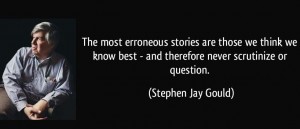The most erroneous stories and those we think we know best – and therefore never scrutinize or question. Often, great quotes grab my attention only to fall into the trash bin the more I think about them. That is, they initially sound profound but once you think about them more, you discover they are not really very well thought through – their application is limited, their scope is exaggerated, or their claim is more theoretical than practical. This quote is an exception to that rule. The more I think about this quote, the more well rounded and universal it appears. I could spout off a thousand examples. One relevant example pertains to this holiday season: any scholar who has looked into the Nativity story has several questions that the average Christian ignores every Christmas as they watch a Nativity reenactment or read Luke 2 or look at a Nativity Set. No room in the inn? really? When you look into the issue carefully, it appears that there was no room for Jesus in the “guest room.” That could create an entirely different Christmas story all on its own. Were Jesus’ relatives unwilling to give up their single guest room for Mary to sleep in because they believed the rumors that the child was illegitimate? How much proof texting was going on when the apostles were retelling the birth of our Savior? We think we know the story well … consequently, we don’t scrutinize it. In fact, scrutinizing it may make us very uncomfortable!
The same thing holds true in our lives. Psychological research shows that when we remember events that held a very strong emotional impact in our lives, we have a strong tendency to embellish the story each time we remember it. In other words, we are prone to exaggeration even when we don’t intend to do so. We think we know the story very well when in fact, we know only our own false version of the story. Witnesses of momentous human events have been interviewed multiple times by scholars to see how their stories change over time. Sure, there is the possibility that they didn’t think about a detail during the first interview and just remembered it later but when you look at all of the evidence, it seems pretty clear that some of those details are just unintentional but very real memory mixing.
As authors, we ought to keep these things in mind. We need good, strong beta readers to ask questions that we may think are desperately obvious – too obvious to even acknowledge in the story (because we know it so well) when in fact, the detail is not obvious at all to the reader and is desperately important for them to know. In other words, we need to scrutinize and question more details in the story – we need impeccable world building. Additionally, when we have conflicts that our characters are trying to resolve based upon traditions, lore, or oral history, it wouldn’t be unlikely that some of the information they received was patently wrong – and that could make for some great plot twists or devastating failures for the first act of a hero’s journey for example. I could see Brandon Sanderson using this technique for one of his epic surprise twists. Have you seen any good examples of this in literature that you’d be willing to share? Post a comment below.



